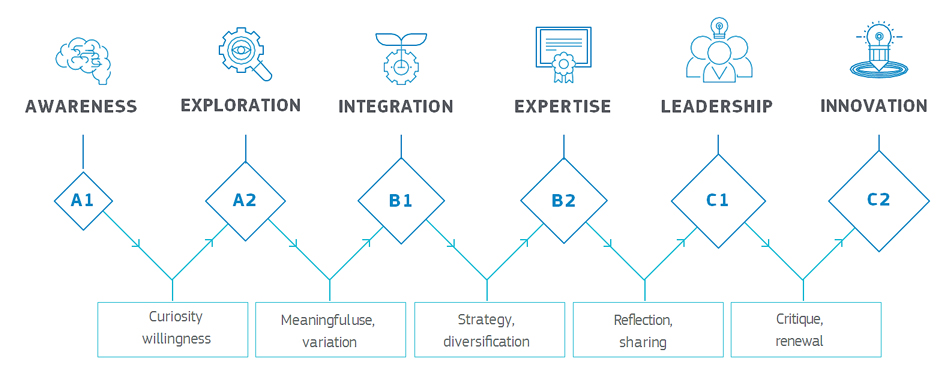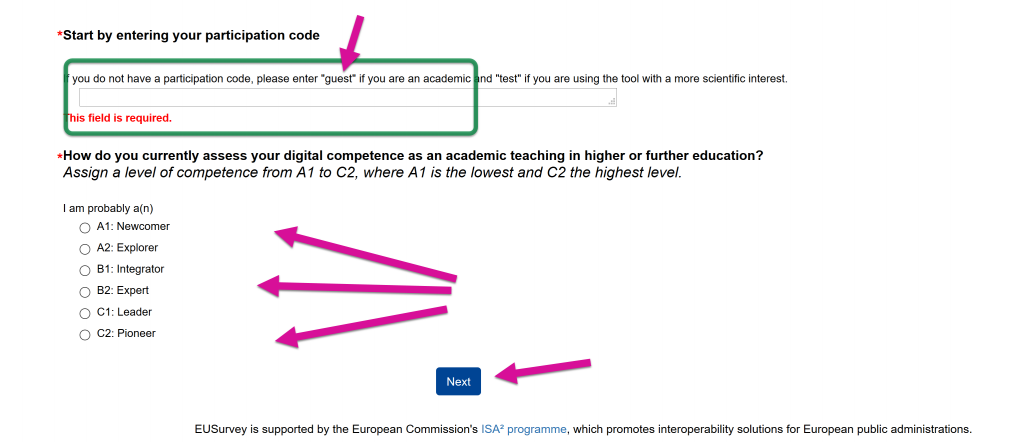10. 1 Next Steps in your PD ~90mins
PURPOSE OF THE TASK:
At this final point in our FLOf 2019 course, we would like to invite you to self-assess your digital competence since it can help you identify and strategize your future development needs.
The tool to guide you in the description of your digital competence is a scientific background framework known as the common European Framework for the Digital Competence of Educators (DigCompEdu) proposed by the European Commission in 2017. DigCompEdu is the synthesis of a number of international and national frameworks, self-assessment tools and training programmes and can thus not only help you describe the facets of your digital competence, but also guide you in the identification of your short-term and long-term training needs.
DigCompEdu sets out 22 competences organised in six areas. The competences are explained at six different levels of proficiency (A1, A2, B1, B2, C1, C2). DigCompEdu addresses educators at all levels of education, from pre-primary to vocational, higher and adult education. The focus of the framework is to support and encourage teachers in using digital tools to enhance and innovate education.
TECHNOLOGY: You will access an online self-assessment tool that is based on the DigCompEdu Framework mentioned above. This tool aims to allow you to reflect on your strengths and weaknesses in using digital technologies in education. You are going to self-assess yourself against 22 items that are representative for the 22 competences in DigCompEdu. For each of these items, choose one of five answer options.
INSTRUCTIONS:
STEP 1: Familiarize yourself with the proficiency level A1-C2 that will be used for the self-evaluation by clicking on this link: Competency Descriptors. You can also access the results document I received after taking the survey as an instructor of FLof2019 by clicking on the following link: DigComEdu Check-In-Results Joerdis.
STEP 2: Now do the survey yourself by clicking on this link: DigCompEdu Survey. Enter “guest” as the participation code and make an (gu)estimate for your current proficiency level as shown in the screenshot below. Lastly, hit “next” to start the survey.
STEP 3: Optional. You can share your results with this cohort if you like, but there is absolutely no need to.
STEP 4: Identify some of your future training needs. If you think that the Teaching Centre can be of assistance in helping you meet those needs, please share your ideas for future PD offering with us in a way that you prefer.
TEACHING INTENTIONS:
With an apparent lack in pre-service training of higher education professionals to teach online (Lalone, 2019; Bates, 2019) university educators will need to find ways to continuously update their digital and pedadogical skills in order to be able to teach in blended and full online environment utilizing sound pedagogy and appropriate technology. Since the skillset required for online instruction is highly complex (Ní Shé, 2019), good planning on the parts of the educators as well as sustained institutional support are required to help effeciently sustain the professional processes of transformation.
This activity can guide instructors in taking a pro-active approach to identifying lacking skills and strategizing PD in their preferred modalities.
References
Redecker, C. European Framework for the Digital Competence of Educators: DigCompEdu. Punie, Y. (ed). EUR 28775 EN. Publications Office of the European Union, Luxembourg, 2017, ISBN 978-92-79-73494-6, doi:10.2760/159770, JRC107466. Retrieved from https://ec.europa.eu/jrc/en/digcompedu



